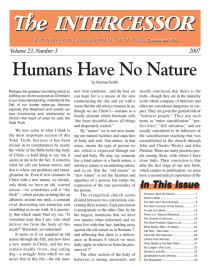
Editor’s Note
In this issue of The Intercessor, we focus what Norman called "The most important section of our Total Truth…missed in its completeness by nearly the whole of the Bible-believing body of Christ": that humans are containers and agents of deity, not self-existent selves. Having spent much of his life mining the scriptures to discover the truth about our humanity and how we function in relationship to God, Norman Grubb shared his treasure with all who would hear. At the risk of appearing repetitive, we have assembled feature articles as well as excepts from several of Norman’s books that lay out in detail the biblical foundation and practical application of this key truth. And if, as Norman says, we "learn to live by the repetition of recognition," this issue will give ample opportunity for learning.
The lead article, taken from Norman’s last full-length book, Yes, I Am unmasks the misunderstanding so prevalent in the Church–the false idea that when Christians have two natures –the corrupt "old nature" and the redeemed "new nature"–that are constantly in conflict. Instead, Norman provides biblical illustrations that humans have no independent human nature; instead we are neutral vessels containing one of two deity natures–Christ or Satan. This article explores the revolutionary truth that sets us free to be what we were created to be: expressers of the Divine nature.
Three articles, "Old Man, New Man," "Have We Two Natures?" and "What is the New Man?" explore in greater depth the origin and danger of the "two natures" misconception about our human makeup with clear biblical teaching on the total replacement of Satan’s spirit by Christ’s–effected for me by Jesus’death on the cross and personally appropriated by faith individually when I accept Christ as Savior.
"The Sole Function of the Human," explains how we inherited the concept that we are self-sufficient from the Fall and instinctively regard ourselves as something much more than containers, rather than totally dependent upon our indwelling Operator. This point is developed further in "The Self Can’t Be Improved." Satan’s lie is that we are independent, separated selves who can be improved; instead, at conversion "we were restored through Him to the eternal union–eternally indivisible"–functioning as Christ’s body, directed by Him as the head and like branches manifesting the fruit of the Vine. Another excellent resource on this topic is Norman’s booklet, No Independent Self, reviewed by Mary Walsh in "A Look at a Book."
Along the same vein, Brett Burrowes’ Bible Study, "Man–A Vessel," presents a clear picture of what it means to be a vessel, putting our humanity into proper perspective. Pointing to Paul’s explanation that there are noble and ignoble vessels, Brett asks, "Wouldn’t you rather be a vessel of gold than a garbage can?"
But what about sin in the believer? How do we sin if we are Christ-operated? Norman’s, "The Answer Continued" explains how all sins are ultimately a consequence of believing the lie of independent self–and how replacing that lie with the truth of our union with Christ liberates us to be the Christ-expressers that we were created to be. Page Prewitt’s article, "The Real Problem: Satan’s Lie," explains how wrong believing about ourselves–seeing myself as an alone "I"–is the sin that allows Satan to misuse us through our soul and body: "sin in my members."
Finally, on a more personal note, "There is a Second Blessing" is Norman’s account of his personal crisis that drove him to change "from the false idea of becoming something to containing Someone." Norman also poured out this precious truth in his personal correspondence. In this issue’s two "Letters to Norman," we see how Norman used the writers’ misunderstanding of our human make-up as a backdrop to teach and clarify our function as receivers ("vessels") and expressers of Deity.





